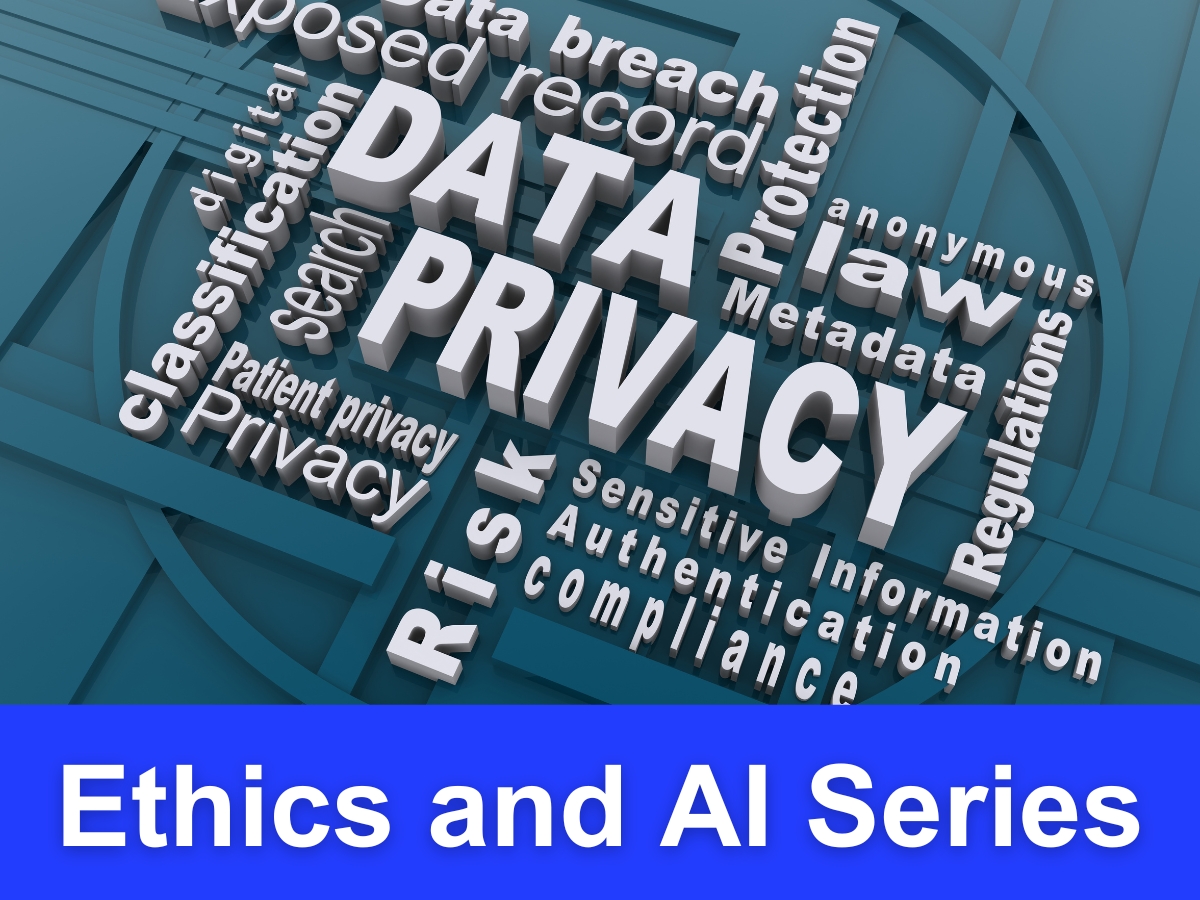In the intricate world of AI, comprehending the critical nuances of data privacy in AI is more vital than ever. Addressing the major ethical dilemmas of data privacy is paramount for professionals and organizations, setting the foundation for responsible and transparent AI advancements.
A Briefing for the AI Data Privacy Advocate:
- Data privacy in AI delves into safeguarding personal information, understanding how AI systems access, process, and store this data, and ensuring its protection against misuse. The implications of neglecting these ethical aspects can be profound, leading to breaches, mistrust, and potential legal ramifications.
- Every AI expert and stakeholder must be well-versed in these dilemmas. Understanding and acting upon these ethical challenges of data privacy builds trust among users and shapes the path for AI’s moral evolution.
By prioritizing the ethical facets of data privacy in AI, entities pave the way for a future where AI systems are both innovative and respectful of individual rights. This balance is crucial in maintaining public trust and ensuring AI technologies are utilized responsibly in our interconnected digital age.
Welcome to the first article in the Ethics and AI Series. These Blue Lane Group posts aim to shed light on the multifaceted dimensions of AI ethics, guiding professionals and enthusiasts in navigating this intricate landscape with informed decisions and practices.

Disclosure: The digital products mentioned in this article are highly regarded in the marketplace and are endorsed by the Blue Lane Group staff. We may earn a commission at no additional cost if you purchase through the provided links.
Table of Contents

Introduction: Understanding the Importance of Data Privacy in AI
In today’s technologically-driven era, “data privacy in AI” is becoming a pivotal matter that beckons attention from all quarters. From consumers relying on AI-driven devices to industries leveraging AI for data analytics, ensuring data remains private is universally recognized.
Amazon Macie is a testament to this shift, utilizing machine learning to discover, classify, and safeguard sensitive data within AWS. Yet, even as companies introduce advanced tools and protocols, many remain in the dark about what data privacy truly entails and why it’s so essential in AI.
As AI integrates more into our daily routines, safeguarding data privacy is not merely an option but an imperative for maintaining user trust and confidence. Moreover, with the surge in AI capabilities, the lines distinguishing between data processors and data protectors often blur, urging a more in-depth look into the dynamics of AI and data.
What is data privacy, and why is it crucial?
At its core, data privacy pertains to the protection of sensitive information from unauthorized access, dissemination, or misuse. When speaking of AI, this definition expands significantly. AI systems, in their essence, thrive on data. Every recommendation, prediction, or action stems from the extensive data they are fed.
Apple’s Privacy Tools exemplify data privacy and AI intertwining, emphasizing data minimization, on-device intelligence, and transparent data usage. Yet, as AI becomes more sophisticated, so do the threats to data privacy.
DataFleets, for instance, facilitates data science and analytics while upholding data security and compliance. It’s not merely about safeguarding information; it’s about preserving the integrity of AI systems that promise enhanced efficiencies. The role of data privacy in AI transcends technological boundaries, touching upon ethical, societal, and personal dimensions.
The symbiotic relationship between AI and data
The relationship between AI and data can best be described as symbiotic. One cannot exist without the other. AI thrives on data, while data gains significance when analyzed and interpreted through AI. Tools like the Google Differential Privacy Library embody this relationship, helping developers balance data utility and user privacy.
Further exploring this synergy, Federated Learning offers a unique approach to machine learning, training models on decentralized devices, thus prioritizing Privacy since raw data doesn’t depart from the local device.
Similarly, Enigma presents a decentralized protocol, enabling computations on encrypted data, ensuring that the essence of data privacy remains uncompromised. As we delve deeper into the capabilities of AI, we recognize that it’s not just about accumulating data but responsibly managing and protecting it, solidifying the inseparable bond between AI and data.

The 10 Major Ethical Dilemmas of Data Privacy in AI
In the expansive world of AI, the rapid evolution of technology often precedes the establishment of ethical and Privacy standards. With the integration of AI into nearly every aspect of our lives, data privacy presents not just technological challenges but profound ethical dilemmas.
These dilemmas touch upon foundational principles of human rights, equity, and societal structures. Navigating the waters of AI ethics and data Privacy requires understanding these ten significant dilemmas at the intersection of technology, ethics, and human rights.
1. Consent for Data Collection: Ensuring Informed Participation
The acquisition of data is pivotal for the advancement of AI. However, the ethics surrounding uninformed data collection are intricate and multifaceted. AI’s expansive reach means that many platforms automatically collect a plethora of user data, often without concise user consent.
Amazon Macie and Apple’s Privacy Tools have been at the forefront, championing transparent and consensual data collection methods. These tools underscore the importance of understanding what data is being accumulated and its broader implications.
It’s a delicate dance for businesses and developers, trying to balance user-friendly experiences with the need for informed data collection. This balance is paramount, as non-consensual data collection can shatter trust, paving the way for potential data misuse.
2. Bias and Discrimination: How AI Can Misrepresent Data
Data biases can have profound implications when transferred to AI, leading to unintentional discrimination and misrepresentation. If AI training data is skewed or biased, AI models may inadvertently perpetuate these biases, with severe real-world consequences.
While equipped with advanced privacy settings, facial recognition tools like Face++ can falter if the underlying data is inherently biased. The dilemma isn’t just about recognizing these biases but actively rectifying them. Tools and communities like OpenMined advocate for unbiased AI algorithms, emphasizing the importance of inclusivity.
Addressing this dilemma goes beyond mere algorithm tweaks. It requires a fundamental reevaluation of how data is collected, categorized, and utilized, ensuring fairness and representativeness at every stage.
3. Data Breaches: The Constant Threat to AI Systems
Data breaches are omnipresent threats in our digital age, with AI systems being particularly susceptible due to the vast troves of sensitive data they handle. A breach can inflict financial wounds and irreparably damage trust and reputation.
With products like DataFleets, there’s a strong emphasis on data security during analytics. However, the dynamic nature of cyber threats demands relentless vigilance. As AI permeates sectors like finance and healthcare, the potential ramifications of breaches magnify exponentially.
Robust encryption techniques, championed by solutions like HElib and proactive threat monitoring, are no longer optional. They are essential cornerstones for safeguarding data privacy in the AI landscape.

4. Accountability and Responsibility: Who’s to Blame for AI Mistakes?
The increasing autonomy of AI systems complicates the attribution of responsibility when things go awry. Determining who bears the brunt of accountability—the developer, user, organization, or the AI system—becomes a nuanced challenge.
Consider the hypothetical situation where a renowned data protection tool like Privitar falters due to an AI glitch. Who should be held accountable? Pinpointing responsibility is not just about legal clarity but is integral to building and maintaining trust in AI systems.
The stakes soar as AI embeds itself more profoundly in critical decision-making arenas. Establishing clear, transparent frameworks for accountability, especially in data privacy in AI, becomes a pivotal ethical challenge.
5. Surveillance and Monitoring: Walking the Fine Line Between Safety and Invasion
Surveillance and monitoring through AI bring forth a compelling dichotomy. On one hand, they promise enhanced safety and security; on the other, they risk infringing upon personal freedoms and Privacy. The proliferation of AI-powered surveillance tools has intensified the debate about where we draw the line.
Tools like Face++, while primarily designed for facial recognition, have applications in surveillance. But without rigorous privacy controls, they might inadvertently tip the scale towards invasive monitoring. The challenge is to harness the power of AI for legitimate safety concerns without creating Orwellian landscapes.
The crux lies in creating AI systems that are potent in their surveillance capabilities and respect individual privacy rights. With rising concerns about state surveillance and data misuse, striking this balance is a technological and ethical challenge.
6. Data Ownership: Who Owns the Information?
A pressing question emerges in the vast digital landscape: who truly owns the data? Users generate data, but platforms store, process, and often monetize it. The ambiguity surrounding data ownership has far-reaching implications, especially in AI.
Solutions like Oasis Labs emphasize that data should remain confidential and be used appropriately, championing user ownership. However, in many ecosystems, the lines of data ownership are blurred. Does the user who generates the data. Or does the platform, which facilitates its collection and possibly adds value, stake the claim?
This dilemma extends beyond ownership rights to data monetization, sharing, and access. Establishing explicit data ownership norms ensures user rights aren’t sidelined as AI progresses.

7. Purpose Limitation: Ensuring AI Uses Data for its Intended Purpose
Every piece of data collected should have a defined purpose. However, with the vast capabilities of AI, there’s a risk that data could be repurposed, leading to potential misuse. Purpose limitation is rooted in the belief that data should only be used for its initial, intended purpose and not beyond.
Take Palantir Gotham, for example. It offers robust data management and analytics but emphasizes strong privacy controls to ensure data doesn’t stray from intended use. Yet, with the rapid evolution of AI, the temptation to repurpose data for new, unforeseen applications is always looming.
It is imperative to establish robust frameworks that ensure AI systems don’t overstep, using data for purposes beyond their original intent. This is not just about user trust but about upholding the ethical principles underpinning data collection and usage in AI.
8. Anonymization and De-identification: The Challenges of Truly Concealing Identity
In a world teeming with data, ensuring user anonymity becomes paramount. Anonymization and de-identification techniques seek to mask user identities, allowing for data utilization without compromising individual privacy. However, achieving proper anonymization is challenging in the age of AI.
While Differential Privacy offers methods to share aggregate user information without revealing specifics, there are always concerns about potential data reversions. The Google Differential Privacy Library aids developers in implementing these methods, but the challenge persists.
Even when data seems de-identified, sophisticated AI tools might reassociate it with its source. Ensuring robust, fail-safe anonymization is more than a technical challenge; it’s an ethical responsibility to protect individuals in an interconnected, data-driven world.

9. Transparency and Explainability: The Need for Understandable AI Processes
AI’s inherent complexity sometimes shrouds its processes in mystery. Yet, understanding how AI makes decisions is crucial for users to trust AI, especially concerning data privacy. This calls for transparency and explainability in AI design and operation.
Products like Enigma, which performs computations on encrypted data, highlight the value of transparency in ensuring data privacy. But beyond just tools, the AI community, spearheaded by entities like OpenMined, stresses the need for AI that can be explained and understood.
AI should not be a black box. Whether it’s a recommendation algorithm or a data privacy tool, users have the right to grasp the underlying mechanisms. Prioritizing explainable AI builds user trust and ensures ethically sound AI applications.
10. Global Variations in Data Privacy Laws: Navigating the Complex Legal Landscape
Data privacy isn’t just an ethical dilemma; it’s a legal labyrinth. Different countries and regions come with their own set of regulations and standards. Navigating this intricate landscape is challenging and essential for AI developers and businesses.
For instance, while one country might fully embrace tools like Tor for anonymous communication, another might have stringent restrictions. Moreover, as AI tools like Amazon Macie or Apple’s Privacy Tools operate globally, aligning with varied data privacy laws becomes a Herculean task.
Harmonizing AI practices with diverse legal frameworks isn’t just about compliance. It’s about recognizing the varied cultural and societal norms that shape these laws and ensuring that AI respects them, promoting a truly global and inclusive approach to data privacy.

Solutions and Best Practices to Address Ethical Dilemmas
Addressing the multitude of ethical dilemmas concerning data privacy in AI isn’t straightforward. However, considering the pervasive integration of AI in our daily lives and its massive data appetite, it’s imperative.
This article aims to illuminate viable solutions and best practices to pave the way towards ethically sound AI data management and utilization.
By focusing on transparency, consent, encryption, and inclusivity, we can navigate the intricacies of data privacy with ethical surety and technological proficiency.
Promoting transparent data collection methods
Transparency in data collection forms a pivotal cornerstone in establishing ethical AI practices. When users understand what data is being collected, how it’s being used, and the safeguards in place, it fosters trust and enables informed decision-making.
Technologies like Amazon Macie, which leverages machine learning to discover and protect sensitive data, underscore the blend of technology and transparency.
Moreover, deploying products like Apple’s Privacy Tools, emphasizing transparent data usage, allows businesses to uphold user trust while harnessing crucial data. However, transparency isn’t merely a technological implementation; it’s a commitment to transparent, comprehensible communication with users.
Efforts must be channelized to ensure that every collected data is accounted for and its purpose explicitly communicated to users. Establishing a transparent data collection paradigm is vital to successfully navigating the ethics of AI data management and upholding the users’ trust and privacy rights.
Prioritizing user consent and understanding
User consent isn’t merely a legal requirement; it’s a fundamental ethical principle. Ensuring informed, explicit user consent prevails through every data interaction is vital to maintaining a moral stance in AI practices. Consent isn’t just about agreement but understanding – users should comprehend what they agree to.
Tools such as DataFleets, which manage data analytics while preserving Privacy and ensuring compliance, embed user consent into their operational fabric. Ensuring that users are not only informed about data collection but also understand the implications thereof is critical.
Platforms and AI systems must ensure user consent is informed, unambiguous, and obtained without coercion. This involves clear communication, straightforward opt-in and opt-out options, and continuous efforts to educate users on the implications of data sharing and usage in an AI-driven digital ecosystem.

Leveraging advanced encryption techniques for data protection
Securing data through advanced encryption isn’t only about protecting against breaches; it’s about safeguarding user trust. Implementing advanced encryption techniques ensures that the data remains unintelligible and unusable even if it falls into the wrong hands. HElib provides a potent example, implementing homomorphic encryption, allowing computations on encrypted data.
Similarly, Homomorphic Encryption allows for operations on ciphertexts, ensuring user data is protected even during computation. These encryption techniques secure data and establish a safety net that protects user privacy and data integrity.
In AI, where data is constantly being moved, processed, and analyzed, robust encryption isn’t an option; it’s necessary. Employing advanced encryption practices safeguards user data against breaches and ensures that AI operates within the ethical boundaries of data privacy.
Championing inclusivity and fairness in AI algorithms
Ensuring AI algorithms are inclusive and fair is paramount in maintaining ethical integrity in AI practices. Bias in AI isn’t just a technological problem; it’s a moral dilemma that can perpetuate societal inequalities and marginalize communities. To ensure fairness, the data utilized by AI must be carefully examined and corrected for any biases.
OpenMined provides an example of a community ardently working towards value-aligned, privacy-preserving AI, ensuring algorithms are built upon ethical foundations. Similarly, inclusivity must be woven into the AI’s operational fabric, ensuring it serves all users equitably and without prejudice.
Championing inclusivity and fairness in AI algorithms goes beyond accurate predictions; it’s about ensuring that AI is a tool for empowerment and not disenfranchisement. It’s crucial to consistently scrutinize and refine AI algorithms to ensure they mirror the ethical aspirations of a fair and just digital society.

The Future of Data Privacy in AI: An Ongoing Conversation
As technology evolves, the conversation surrounding data privacy in AI becomes even more pertinent. The landscape of AI is ever-changing, with new advancements and challenges continually emerging.
As we look forward, it becomes evident that the synergy of governance, technology, and public awareness will shape the future of data privacy in AI. This section delves into these three pillars, highlighting their roles in ensuring an ethically sound AI-driven future.
The role of governments and international bodies in shaping data privacy norms
The importance of effective governance in overseeing and regulating AI cannot be overstated. Governments and international bodies play a pivotal role in crafting and implementing data privacy norms that are both protective and progressive. As AI becomes more ubiquitous, regulatory bodies must balance innovation and Privacy.
Entities like the European Union, with the General Data Protection Regulation (GDPR), have taken significant strides to preserve users’ rights in the digital age. However, regulations shouldn’t merely be reactive but also anticipate future challenges.
Technologies such as Palantir Gotham emphasize the importance of robust privacy controls, which governments can leverage when establishing AI regulations. International collaborations and conventions can help harmonize data privacy standards, ensuring a cohesive approach to AI ethics and Privacy worldwide.

Technological advancements that can reshape data privacy in AI
AI is a rapidly advancing field, and with it comes new methods to ensure data privacy. Differential Privacy, for instance, has emerged as a revolutionary method to share information while maintaining individual Privacy.
Meanwhile, Federated Learning promises a decentralized approach, where data doesn’t leave the local device, fundamentally reshaping how AI can be trained without central data repositories.
Other advancements, such as Enigma, which performs computations on encrypted data, provide glimpses into a future where data privacy isn’t just an add-on but an integral part of the technology. As these technologies mature and become more widespread, they offer hope for a more secure and privacy-centric AI landscape.
Businesses, developers, and stakeholders must stay abreast of these advancements. By integrating these cutting-edge technologies, AI can be powerful and respectful of user privacy.
Public awareness and education as a critical driver for ethical AI
Public awareness and education are the bedrock for any meaningful change in the AI landscape. As end-users of AI systems, the public is interested in understanding and shaping the narrative around data privacy. More informed users can make better decisions, demand transparency, and hold companies accountable.
Initiatives that focus on enlightening the public, such as seminars, workshops, and online courses, can be crucial. The role of products like Apple’s Privacy Tools isn’t just to provide privacy solutions and educate users about the importance of data privacy in AI.
Furthermore, as AI permeates schools, workplaces, and homes, a consistent effort to educate and raise awareness becomes imperative. A well-informed public can be the most potent catalyst in ensuring that AI evolves ethically, ensuring that data privacy isn’t just a technological consideration but a societal norm.

Essential FAQs: Understanding Data Privacy in AI Ethics
Numerous questions arise in the evolving landscape of AI and its intertwining with data privacy. Often foundational, these questions help build a holistic understanding of the topic. To assist readers in navigating the complexities of data privacy in AI ethics, we’ve curated some of the most frequently asked questions and provided brief answers.
1. What is the significance of data privacy in AI?
Data privacy in AI is paramount because AI systems often handle vast amounts of personal and sensitive data. Ensuring Privacy means safeguarding users’ rights, preventing data misuse, and establishing trust in AI-driven solutions. As AI becomes more integrated into daily life, preserving user privacy becomes even more critical.
2. How can biases in AI impact data privacy?
Biases in AI can lead to skewed or discriminatory outputs. These outputs may incorrectly categorize or represent individuals based on flawed data or algorithms, potentially leading to privacy breaches. If an AI system, influenced by bias, misidentifies or misconstrues user data, it can compromise the Privacy of those users and expose them to undesired consequences.
3. What are the challenges in achieving proper data anonymization?
Proper data anonymization is challenging because, with advanced technology, even anonymized data can sometimes be de-anonymized. Factors like data complexity, the availability of auxiliary information, and sophisticated de-anonymization techniques can breach Privacy. Solutions like Differential Privacy and Enigma are steps towards achieving better anonymization, but the challenge remains multifaceted.
4. Why is transparency in AI processes essential for data privacy?
Transparency ensures that stakeholders understand how AI processes and uses data. This understanding is crucial for establishing trust, ensuring that data is used ethically, and informing users of how their data contributes to AI outcomes. Like those offered by OpenMined, transparent processes make spotting and rectifying potential privacy breaches easier.
5. How do global variations in data privacy laws impact AI?
Different countries and regions have varied regulations concerning data privacy. This disparity can pose challenges for AI developers and businesses that operate across borders. They must ensure their systems comply with the laws of each jurisdiction, which can be intricate and sometimes conflicting. The global variation underscores the need for international collaboration and standardized guidelines for AI ethics and data privacy.

Conclusion: Embracing a Balanced Approach to Data Privacy in AI
In the intricate landscape of artificial intelligence, the ethical dilemmas surrounding data privacy cannot be overlooked. As we’ve explored throughout this article, from the initial stages of data collection to the global variations in privacy laws, there are myriad challenges and considerations that developers, businesses, and governments must address.
One of the most profound realizations is that AI and data are symbiotic. AI thrives on data, but without ethical considerations, the very essence of data privacy is at stake. While technology continues to advance rapidly, it is imperative to balance innovation and Privacy. This safeguards users’ rights and fosters trust in AI systems, ensuring wider acceptance and integration into our daily lives.
Biases, breaches, transparency, and accountability are a few hurdles the AI community faces. These challenges, while significant, also present an opportunity to redefine the standards and practices associated with AI. We can harness AI’s full potential without compromising individuals’ privacy rights by championing a balanced approach that equally values technological progress and ethical considerations.
In conclusion, the data privacy journey in AI is ongoing. It’s a conversation that will continue to evolve with technology, public awareness, and global collaboration. It beckons a future where AI transforms industries and societies and does so with the utmost respect for data ethics and individual Privacy.

You Might Also Like:
If you enjoyed this article and received value from it, check out the other Blue Lane Group articles in the Ethics and AI Series:
- Unraveling 10 Core Ethical Concerns in AI Every Expert Must Know
- Shedding Light on the 10 Major Ethical Dilemmas of Data Privacy in AI
- Unlocking 12 Ethical Dimensions Behind Transparency in AI
- Dive Deep: 10 Ethical Dilemmas in Modern AI Development Tools
- Master 11 Essential Principles for Ethical Fairness in AI
- Deciphering the Ethical Maze: 9 Aspects of AI Data Annotation
- Navigate the 9 Ethical Dilemmas of AI and Modern Reputation Scores
- Mastering the 11 Nuances of AI Ethics in Healthcare Practices
- Decoding 11 Key Insights into AI Ethical Guidelines for Businesses
- Unveiling the Future: 10 AI Trends Shaping Ethics in NLP
- Revealing the 9 Ethical Challenges of Security Surveillance in AI Today
- Navigating the Future: 10 Trends Shaping Ethics in Fair AI Systems
- Navigating the Future: 12 Trends Driving AI Employment Ethics
- Exploring 10 Pivotal Issues of AI in Advertising Ethics Today
- Illuminate: 9 Innovative Trends Shaping Ethics in Intellectual Property Rights
- Navigating the Future: 10 Trends Shaping Ethics in AI in Crime Prevention
- Dissecting the 11 Key Ethical Boundaries in Deepfakes and AI
- Unraveling 10 Ethical Implications of AI and Vehicles Today
- Decoding 9 Critical Ethical Practices in Building Trust in AI Systems
- Highlighting 11 Pivotal Ethical Implications in AI Globalization
- Unveiling 10 Ethical Foundations in AI Research Methods Today





